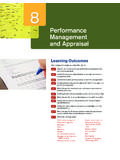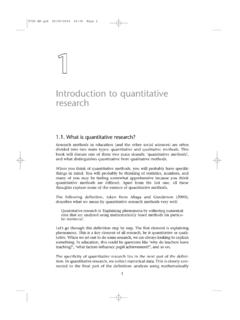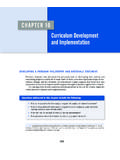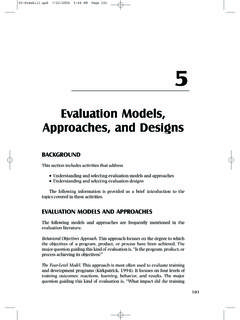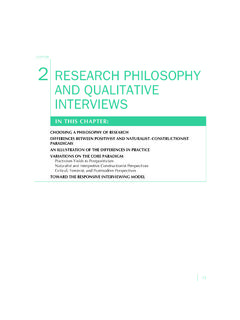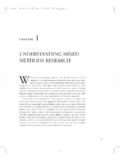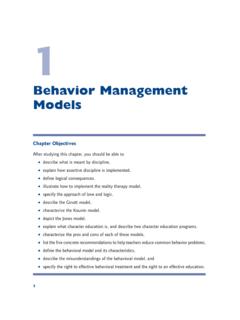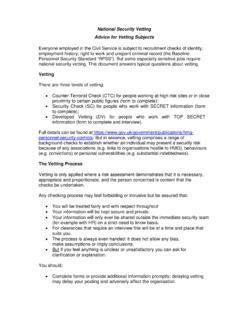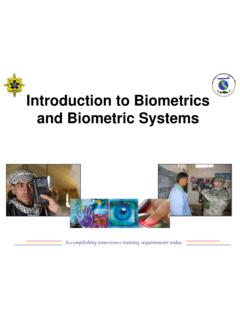Transcription of Ethical Considerations - SAGE Publications Inc
1 Ethical ConsiderationsThe consideration of ethics in research, and in general business for thatmatter, is of growing importance. It is, therefore, critical that youunderstand the basics of Ethical research and how this might affect yourresearch project. This is especially important if your research involves inter-action with businesses or members of the general community who serve asparticipants ( , respondents) in your research. There are a range of inter-actions in your research that might occur, including in-depth interviews,focus groups, surveys, or even observing people s all researchers (student, professional, or academic) are well inten-tioned, there is the possibility that interaction with participants may inadver-tently harm them in some unintended way.
2 This could include Psychological harm for example, researching the use of nudity inadvertising may show participants images that offend them. Financial harm researching unethical behavior within a given firmmay provide management with information on individual employeesthat results in an individual getting fired, or undertaking industry-based research may inadvertently share sensitive information with afirm s competitors, resulting in financial harm to the organization. Social harm researching how lifestyle affects consumption mayunintentionally disclose a person s sexual orientation when thatperson wanted to keep this is your responsibility to consider whether any type of harm could occurwhen you plan your research and to ensure that mechanisms are instituted toremove it.
3 It is, therefore, essential that you carefully evaluate the potentialfor harm to arise and ensure that you (a) behave according to appropriateethical standards; (b) consider how your research mightnegatively affect partici-pants; and (c) protect yourself, your supervisors/teachers, and your institutionfrom being placed in situations in which individuals could make claims of inap-propriate behavior, resulting in public criticism or even your being , there is an increasing amount of litigation in the world andmany universities have processes in place for vetting research to ensure that it 6/2/04 4:41 PM Page 53undertaken in an Ethical fashion. This ensures that the participant is protectedand also ensures that the students, staff, and university undertaking theresearch are covering the topic of ethics, we are not trying to change your values,but rather we want to make you more aware of potential Ethical issues thatmight arise when undertaking your research.
4 To do this, some questions willbe asked that, if appropriately answered, will ensure that potential ethicalproblems are chapter is designed to discuss a range of Ethical issues. Many of theseissues are broadly covered in the various business and marketing ethics texts(for example, Smith & Quelch, 1992) as well as marketing research texts (forexample, Churchill, 1991). These texts tend to look at research ethics froma client-agency perspective; that is, where the researcher is working for aclient. The following material will try to broaden this view by also consid-ering general social research ethics (Homan, 1991), covering a range of datacollection approaches such as participant observation (Bulmer, 1982) andsurveys/experiments (Sieber, 1982).What Is Human Intervention?
5 _____In the context of this chapter, human intervention is defined to encompass abroad range of activities, including interviews, review of corporate records, focusgroups, experiments, oral histories, or surveys. It basically involves the researcherhaving access to information that is not in the public domain. Ifyour researchinvolves accessing information that is readily and publicly available, such as acontent analysis, meta-analysis, or literature review, it is unlikely that much ofthe material discussed within this chapter would apply, although some issues,such as academic fraud and plagiarism, would apply to alltypes of examples of student research that would be less likely to involvehuman intervention would include the following: Content analysis of information contained in advertisements A multiple-regression study that uses data from publicly availabledatabases, such as Predicast An examination of a data set that was collected for another purpose,assuming that the participants had already given their prior permissionfor others researchers to access this dataCodes of Ethical Conduct/Practice_____There are various Ethical codes of conduct that regulate researchers codes discuss many issues that potentially might arise in your research,as well as other issues associated with professional practice (Beauchamp &Bowie, 1997).
6 For example, the American Marketing Association s code ofconduct (AMA, 2003) touches on research-related issues and specifically states54 THE 6/2/04 4:41 PM Page 54 Ethical guidelines are not limited to the marketing discipline, as psychol-ogists also have detailed guidelines regulating research involving humanintervention. As can be seen in Appendix , the American PsychologicalAssociation s (APA, 2003) Ethical Principles of Psychologists and Code ofConductcovers a diverse range of research issues, many of which relate tobusiness research as well. For example, there is a whole section dealing withprivacy and confidentiality (Section 4 of the APA s code).that members must not knowingly do harm. It also specifies other issues ofparticular interest to professional marketers, such as the issues relating to thedevelopment of safe new products or the prohibition of price-fixing activities,and so forth (see Appendix ).
7 Ethical issues are also examined by the European Society for Opinionand Marketing Research s (ESOMR, 2003) Code of Practice, which setsout researchers broad responsibilities (see Appendix ). ESOMR provi-des more detailed codes and guidelines for a range of different activities, rang-ing from broad-based activities such as a Guide to Opinion Polls to morespecific guidelines on Mystery Shopping and Interviewing Children (seeExhibit ). The codes are, of course, not static, and there are also specificdetailed discussions of Ethical practice relating to new technologies such asthe Internet (AMA, 2003; ESOMR, 2003). Ethical Considerations55 Exhibit of ESOMAR Codes and GuidelinesAll ESOMAR members and the management of the marketing research companies listed in theESOMAR Directory have undertaken to comply with the ICC/ESOMAR International Code ofMarketing and Social Research Practice which is applied by over 100 associations International Code of Marketing and Social Research Practice ESOMAR Notes to interpreting the ICC/ESOMAR Code Annexe to the Code Notes regarding European Union Data Protection requirements2.
8 ESOMAR/WAPOR Guide to Opinion Polls3. ESOMAR Guideline on Maintaining the Distinctions between Marketing Research andDirect Marketing4. ESOMAR Guideline on Customer Satisfaction Studies5. ESOMAR Guideline on How to Commission Research6. ESOMAR Guideline on Interviewing Children and Young People7. ESOMAR Guideline on Mystery Shopping8. ESOMAR Guideline on Tape and Video-Recording and Client Observation of Interviewsand Group Discussions9. ESOMAR Guideline on Pharmaceutical Marketing Research. Endorsed by EphMRA10. ESOMAR Guideline on Conducting Marketing and Opinion Research Using the Internet11. The ESOMAR Arbitration Service12. The ESOMAR Disciplinary Procedures (PDF file) 6/2/04 4:41 PM Page 55 Many universities have also developed guidelines for conducting ethicalresearch (Polonsky, 1998).
9 In Australia, all universities have agreed to haveall research comply with one set of Ethical guidelines for alltypes of humanintervention. These guidelines were developed by the National Health andMedical Research Council (NHMRC, 2003a) and apply to all types of addition to the guidelines, the NHMRC also produced the HumanResearch Ethics Handbook, which is the primary guideline for ethics com-mittees and researchers alike (NHMRC, 2003b).Within some universities, researchers, students, and staff must completedetailed applications to be reviewed by an independent ethics committee(sometimes called a human subjects committee or human research ethics com-mittee) before research can be undertaken (Polonsky, 1998). These commit-tees apply basic Ethical principles to all research and seek to ensure that allethical issues are considered and appropriately addressed.
10 Though not all theissues in every code of practice will apply to your research, reviewing thesecodes will give you some idea of the complexity of the issues that need to beaddressed when planning your research project. Some of these issues will bedescribed in more detail later in this Philosophies_____Within the ethics discipline there are a number of different approachesfor examining ethics and values. Two philosophical approaches that relateclosely to the discussion of student research ethics are deontological andteleological philosophies. To assist you in getting a better understanding ofwhere harm may arise, a number of approaches will be briefly to Skinner, Ferrell, and Dubinsky (1988), deontological philo-sophies focus on the factorsor means used to arrive at an Ethical philosophies emphasise moral obligations or commitments thatshould be binding or necessary for proper conduct (p.)
